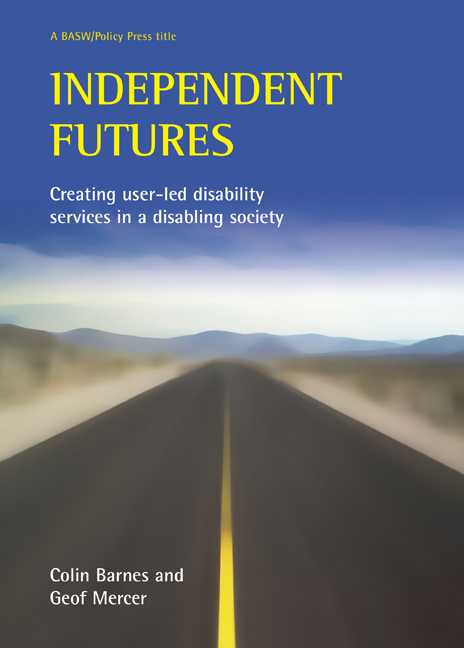Book contents
- Frontmatter
- Contents
- List of figures and tables
- Acknowledgements
- Notes on the authors
- one Examining user-led services
- two Traditional approaches: disability policy and the welfare state
- three Disability activism and the struggle for independent living
- four Researching user-led organisations
- five User-led organisations: building an alternative approach
- six Service design and delivery: opportunities and constraints
- seven Service users’ views and experiences
- eight Politics and campaigning
- nine Policy change or retrenchment?
- ten Future directions
- References
- Index
eight - Politics and campaigning
Published online by Cambridge University Press: 15 January 2022
- Frontmatter
- Contents
- List of figures and tables
- Acknowledgements
- Notes on the authors
- one Examining user-led services
- two Traditional approaches: disability policy and the welfare state
- three Disability activism and the struggle for independent living
- four Researching user-led organisations
- five User-led organisations: building an alternative approach
- six Service design and delivery: opportunities and constraints
- seven Service users’ views and experiences
- eight Politics and campaigning
- nine Policy change or retrenchment?
- ten Future directions
- References
- Index
Summary
Introduction
The unprecedented politicisation of disability by disabled activists and groups in Britain was fuelled by the philosophy of independent living and the social model of disability. Political campaigning has been an important factor in the government decision to introduce major legislation such as the 1995 Disability Discrimination Act and the 1996 Community Care (Direct Payments) Act. Despite their shortcomings, these have enhanced both disabled people's claim to citizenship rights and their participation in disability-related services. It is also necessary to consider how the changing politics of disability have impacted on Britain's network of user-controlled organisations and Centres for Independent/Integrated/Inclusive Living (CILs).
This chapter will examine the conflicts and dilemmas for user-controlled organisations that arise from their dual roles of service provider and political advocate for disabled people's rights. Two main questions are posed: first, how far have disabled people's organisations maintained their traditional role in political campaigning and advocacy? Second, how far, and in what ways, has their campaigning role been constrained by the demands of being a service provider within an organisational and policy environment that is liable to prove hostile to overt political engagement. The discussion examines: first, the range of campaigning activities, from local to international levels, engaged in by user-led organisations; second, the aims and tactics of campaigning; third, the range and character of ‘consciousness-raising’ activities; and finally, the impact of campaigning on the relationships with funding bodies.
Politics: the local viewpoint
The politicisation of disability in the 1960s and 1970s generated both an ideological and a practical solution to the problem of disabled people's exclusion from everyday life in the development of the philosophy of independent living, and self-help organisations (Oliver and Zarb, 1989; Charlton, 1998). The growth of user-controlled provider organisations such as CILs signalled a further phase in collective political action. This was illustrated in the political action in support of direct payments:
‘People in the scheme campaigned quite hard in terms of lobbying politicians, going to meetings, going to politicians and harassing them in order to establish and maintain the scheme … within an organisation of disabled people with a funding base to enable them to deliver a quality service.
- Type
- Chapter
- Information
- Independent FuturesCreating User-Led Disability Services in a Disabling Society, pp. 137 - 158Publisher: Bristol University PressPrint publication year: 2006



